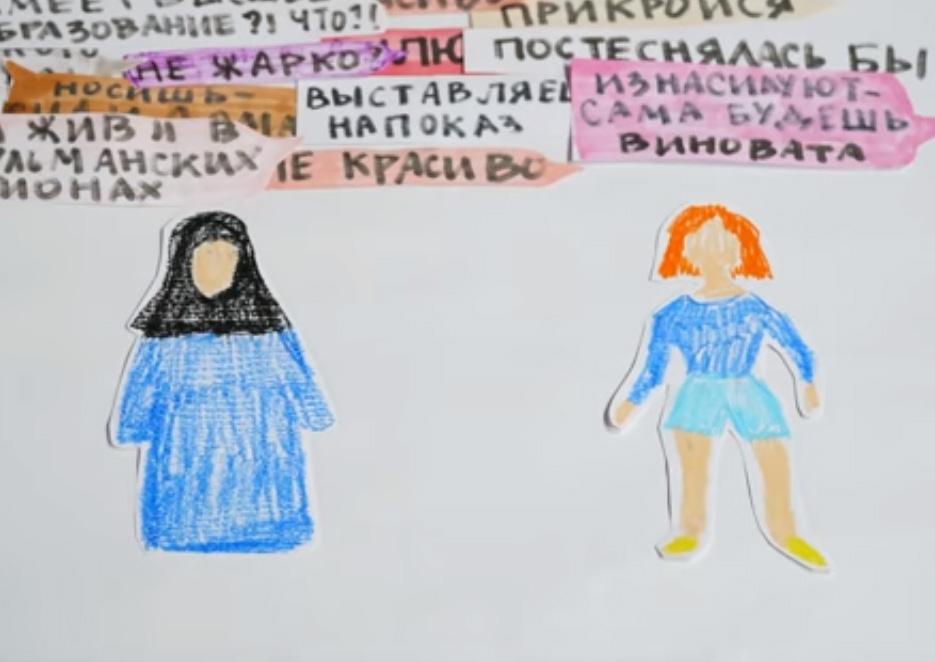
9 minute read
BFI in action
NOTHING FOR US WITHOUT US
This slogan says that we speak on behalf of ourselves and for ourselves. We have no beneficiaries. We have ourselves, and we are our own community. We are building activism to improve our own lives, rights and freedoms. For example, we cannot speak on behalf of abducted women and manage projects related to their lives when no one in our community was a victim of that. But we are building solidarity with them by involving them in our activism while sympathizing and supporting each other. This is not a problem of just one person, but for all of us. We are all oppressed by the same system.
Advertisement
Most activists work on a volunteer basis (at least 30% of all activists, but on average 70%), and some are paid such as authors, organizers and coordinators in the Working Team and Organizing Group. Participants had to adhere to the principles of responsibility, flexibility, accountability, mutual assistance, and collective care, however people often neglected with the reporting. We only had minimum resources and conditions available for working in our House, and they were used to cover traveling, communication and food expenses, medical expenses, rehabilitation and evacuation expenses (as much as our financial capabilities would allow).
BFI participants were given the opportunity to create their own initiative groups, to gain experience as organizers, to build solidarity and fundraising, to maintain institutional membership in various networks, and to participate in conferences, seminars/schools, exchange programs, residences and mentoring.
Our work is difficult to measure by traditional results and indicators. Existing methods for monitoring and evaluation rarely account for the invisible and visible societal impacts of our daily efforts then and now
Collective decision making within the Working Group
If even one member of the Working Group was unable to participate in a given meeting for any reason, a final decision would not be reached. Firing, written warnings or other degrading practices enshrined in the Kyrgyzstani Labor Code were never employed at BFI. Several initiatives are described below. Please note that we’re not listing them in order of importance or priority given to them in the BFI, but in order that is more comfortable for us, as authors, to accurately describe the initiatives that we coordinated, rather than describe the initiatives in which we were least involved.
Saadat
As the Youth Activism Initiative coordinator, I would like to tell you why this initiative was close to me starting with a few core facts:
1. “Nothing about us without us!” is a slogan used in many movements, where the people from communities represent their own interests, and young people are no different.
2.Young people are a heterogeneous group with different privileges and vulnerabilities.
We are all different, and the only thing that unites us is our age category.
3. Young people are not only the future but are also the present. The main focus of this initiative was the strengthening of youth advocacy and building a youth activist movement to advocate for human rights, justice and equality. The initiative promoted the building of equal partnerships with decision-makers, as well as the pushing for significant participation and representation of different groups of youth activists at all levels in decision-making processes in both civil society and state structures.


We would like to see ourselves free from patriarchal prejudices and hierarchies in all spheres, structures, institutions and communities. For this reason, we decided to write our experiences, thoughts and vision in a publication called Activist Kurultai30 which is available online in both Russian and Kyrgyz.
“Activist Kurultay” (in Kyrgyz)
Read
“Activist Kurultay” (in Russian)
Read
Reclaiming music
As a person who adores music, our musical initiative was truly close to my heart.
The music industry in our country is dominated by truly patriarchal songs created by patriarchal musicians and producers. Often sexism and discrimination in this sphere make it impossible for us to develop creatively, build a career, or simply participate. Moreover, most music produced in Kyrgyzstan, particularly mainstream music, tends to be very patriarchal that objectifies our communities while praising aggression and violence.

Most of the lyrics of popular songs in Kyrgyzstan objectify women while pushing invented standards of beauty. Moreover, these songs use the image of women to achieve greater control and popularize the notion that women are not people but rather a national resource.

Many songs victimize women. Women are shown to be weak, fragile, and in need of men’s protection. Based on my own experience, the musical sphere did not really consider women’s contributions and participation as being on par with men. This sphere is truly toxic and does not allow women to develop as musicians but rather forces them out. I am glad that in recent years more and more songs and singers like Zere Asylbek have appeared on the scene with feminist songs while promoting the equal rights and visibility of young women.
One of the core ideas of our musical initiative was that everyone can compose, write and play
Saadat
music and express themselves. This is especially important when there is no music that reflects the diversity of experience of those who are unheard and unseen more often than not. This was an opportunity for residents and activists of Bishkek to express themselves, reflect, describe their experience and respond through various texts.
Feminist forms of protest music were sang and played during the March 8th feminist march where participants set the march’s pace by playing on homemade musical instruments.
In 2016, we decided to create our own trans-feminist music camp that aimed to liberate, emancipate, unite our women, girls and T * communities by writing and playing feminist music, recording videos, and becoming more aware of our own personal political positions. We sought to reclaim music! As part of this camp, our group published some of our work in the Russian-language zine “Стихи и проза из транс-феминистского музыкального кэмпа (Poems and Prose from the Trans-Feminist Musical Camp)”.

Read
Watch
Aizat
Parent and Child Initiative

I coordinated this initiative, because we saw the need to raise the issue of feminist parenthood, to discuss the challenges that we as parents face in raising children or in interacting with the educational institutions teaching our children. This initiative was created for activist mothers, BFI participants and their children as an alternative education for children with a feminist approach. This was a space where our children could be supervised while their parents were busy with activism or simply needed time to run errands. It was a space of solidarity and mutual support where children were free from gender norms and the dull activities at their schools. We held discussion groups for parents about sexual education, violence prevention and gender stereotypes.
As a group we tried to discuss and find solutions to issues facing us as a group. How do we ensure that children won’t renounce their mothers, because her opinions, attitude, values and behavior are different from others and are considered incorrect? How do we teach our children the necessary language and skills to say when they feel uncomfortable or to simply say “no” in a society where children are taught to obey adults and not talk back. In April 2018, as a result of our discussions with children and adults, the parents, children, adolescents and young people of the BFI, with the help of a children’s specialist, developed an internal policy for relations with children that protects their interests and rights.
This initiative helped me reeducate myself as a mom. I try not to build hierarchical relationships with my child. I work on myself in order to act in the interests of the child while upholding my responsibility as a parent to protect her when it comes to issues of her safety or health. The thin line between honesty and openness, freedom and boundaries.


Islam and feminism
Aizat

As a practicing Muslim woman, I have never felt that I was committing a sin by engaging in feminist activism or that these were two disjointed or contradictory ideologies. For me, Islam is system of belief and not an organized religion. Everything in Islam is done in the name of peace and love, and the same is true in intersectional feminism. I see many general principles shared between them. Feminism and Islam are not polar opposites just as feminism and secular society are not necessarily one and the same.

I coordinated this initiative and was limited by scanty literature and discussions that presented more questions than answers. Basically, all literature on Islam and feminism was available only in English. In the discussion groups, we touched on the principles of social justice, the patriarchal interpretation of the Quran, issues of diversity, and SRHR (sexual and reproductive health and rights). It was a amazing for me to learn that there are groups and movements around the world that draw on both Islam and diversity. I discovered that I am not the only “abnormal” person who reads namaz and fasts while also being a feminist. In 2015, through BFI I learned through about the activities of the CSBR (Coalition For Sexual and Bodily Rights in Muslim Societies). As part of the Coalition’s events, we conducted various online campaigns dedicated to the international campaign “One Day — One Fight”. The campaign raises issues of SRHR and physicality in Muslim communities with posts like “Learn my opinion and don’t wrap me up (2013)”, “Uniting for sexual and bodily rights (2015),” and “Hijab and short shorts (2017).” In July 2017, the annual CSBR Institute was held in Bishkek in partnership with BFI with participants from 17 countries for the first time in the feminist history of Kyrgyzstan.
As I reflect on this initiative, I realize that it has freed me from the orthodox Islam that controls women, our bodies, and our lives in all areas. We criticized the institutionalized structures of patriarchal, secular and religious principles while upholding the individual aspects of faith and spirituality. We discussed our path to religious freedom. I needed a faith that did not punish me and accepted me as a free and independent individual, and I found it.





Watch Watch










